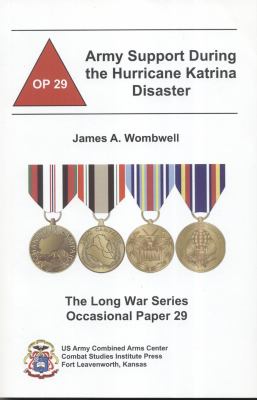
Book
|
Army support during the Hurricane Katrina disaster
Copies
12 Total copies, 11 Copies are in,
1 Copies are out.
Title
Army support during the Hurricane Katrina disaster
Call No
HV636 2005.U6
Subjects
United States. Army--Civic action.
Hurricane Katrina, 2005.
Disaster relief--Gulf states.
Emergency management--Louisiana.
Disaster relief--Louisiana.
Hurricane Katrina, 2005.
Disaster relief -- Gulf States.
Disaster relief--Gulf States.
United States--Armed Forces--Civic action.
United States--National Guard--Civic action.
United States-- Armed Forces--Civic action.
United States -- National Guard -- Civic action.
(DLC)n 78095330United States--Armed Forces--Civic action.
(DLC)n 78095330United States--National Guard--Civic action.
Hurricane Katrina, 2005.
Disaster relief--Gulf states.
Emergency management--Louisiana.
Disaster relief--Louisiana.
Hurricane Katrina, 2005.
Disaster relief -- Gulf States.
Disaster relief--Gulf States.
United States--Armed Forces--Civic action.
United States--National Guard--Civic action.
United States-- Armed Forces--Civic action.
United States -- National Guard -- Civic action.
(DLC)n 78095330United States--Armed Forces--Civic action.
(DLC)n 78095330United States--National Guard--Civic action.
Language
English
Published
Fort Leavenworth, Kan. : Combat Studies Institute, 2009.
Publication Desc
x, 267 pages : illustrations ;
ISBN
9780980123692
LCCN
2009000944
Series
Dimensions
23 cm.









